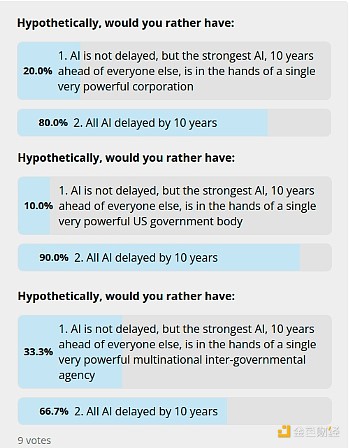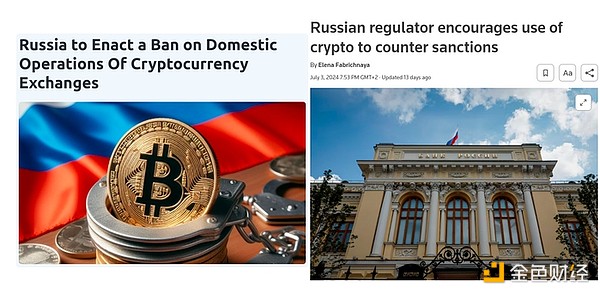Author: Ethereum co-founder Vitalik; Translator: Baishui, Golden Finance
Over the past few years, "cryptocurrency" has become an increasingly important topic in political policy, with various jurisdictions considering bills to regulate various actors in various ways to engage in blockchain affairs. This includes the European Union's Crypto Asset Market Regulation (MiCA), the UK's regulatory efforts on stablecoins, and the complex legislative and enforcement regulatory attempts of the SEC that we have seen in the United States. In my opinion, many of these bills are reasonable, although there are concerns that governments will try to take extreme measures, such as considering almost all currencies as securities or banning self-custody wallets. In the wake of these concerns, the cryptocurrency field has increasingly tended to become more actively involved in politics, and to decide whether or not to support these parties and candidates almost entirely based on whether they are willing to be tolerant and friendly to "cryptocurrency".
In this article, I argue against this trend, especially because I think that making decisions in this way has a great risk of violating the values that originally brought you into the cryptocurrency field.
“Crypto” is more than just cryptocurrencies and blockchain
In the crypto space, there’s a tendency to obsess over the centrality of “money”, and the freedom to hold and spend money (or, if you prefer, “tokens”), as a secondary political issue. I agree there’s an important battle here: in order to do anything important in the modern world, you need money, so if you can block anyone from getting it, you can suppress your political opposition at will. The right to spend money privately, which Zooko has tirelessly advocated for, is equally important. The ability to issue tokens could greatly enhance people’s ability to create digital organizations that actually have collective economic power and can do things. But the near-exclusive focus on cryptocurrencies and blockchains is harder to defend, and importantly, it’s not the ideology that created cryptocurrencies in the first place.
The original creator of cryptocurrencies was the cypherpunk movement, a broader techno-libertarian ethos that advocated for free and open technology as a way to protect and enhance individual freedoms. Back in the 2000s, the main theme was resistance to restrictive copyright legislation pushed by corporate lobbying groups such as the RIAA and the MPAA, which the Internet referred to as "MAFIAA". A famous legal case that caused a lot of resentment was Capitol Records, Inc. v. Thomas-Rasset, where the defendant was forced to pay $222,000 in damages for illegally downloading 24 songs through file-sharing networks. The main weapons in this fight were torrent networks, encryption, and Internet anonymization. People learned the importance of decentralization very early. As explained in one of the very few public political statements made by Satoshi:
[Long exposition on the system's vulnerability to monopoly by force omitted.]
You will not find the solution to political problems in cryptography.
Yes, but we can win a major battle in the arms race and gain a new free territory in a few years.
Governments are good at cutting off the leadership of centrally controlled networks like Napster, but pure P2P networks like Gnutella and Tor seem to be able to hold their own.
Bitcoin is seen as an extension of this ethos for internet payments. There’s even an early “regeneration culture”: Bitcoin is an incredibly simple way to pay online, so it can be used as a way for organizations to compensate artists for their work without relying on strict copyright law. I’ve been involved in this myself: in 2011, when I was writing for Bitcoin Weekly, I developed a mechanism where we would publish the first paragraph of two new articles I wrote, and we would hold the rest “as ransom,” releasing the content when total donations to a public address reached a specified number of BTC.
The point of all this is to contextualize the mentality that created blockchains and cryptocurrencies in the first place: freedom is important, decentralized networks are good at protecting freedom, and money is an important area where such networks can be applied—but it’s only one of many important areas. In fact, there are several important areas where you don’t need a decentralized network at all: instead, you just need cryptography and one-to-one communication applied correctly. The idea that freedom to pay is core to all other freedoms is an afterthought — a cynic might say, an ideology formed retroactively to justify “digital ascent.”
I can think of at least a few other technical freedoms that are as “foundational” as the freedom to use crypto tokens:
Freedom of communication and privacy:This includes encrypted messaging and anonymity. Zero-knowledge proofs can protect anonymity while ensuring important authenticity claims (e.g., that a message was sent by a real person), so use cases that support zero-knowledge proofs are important here as well.
Free and privacy-friendly digital identities:There are a few blockchain applications here, most notably various use cases that allow revocation and “proving denial” in a decentralized manner, but hashing, signatures, and zero-knowledge proofs are actually used ten times more than that.
Freedom of Thought and Privacy:This aspect will become increasingly important in the coming decades as more and more of our activities are mediated by AI interactions in increasingly deeper ways. Unless something changes dramatically, the default path is that more and more of our thoughts will be mediated and read directly by servers held by centralized AI companies.
High-Quality Information Access:Social technologies that help people form high-quality opinions on important topics in an adversarial environment. I’m personally bullish on prediction markets and community notes; you may have a different opinion on the solutions, but the point is that the topic is important.
The above list is just the technologies. The goals that motivate people to build and participate in blockchain applications often have non-technical implications as well: if you care about freedom, you might want the government to respect your freedom to have the home you want. If you care about building a more efficient and fair economy, you might want to look at the impact this has on housing. And so on.
My basic point is this: if you’re the kind of person who’s willing to read past the first paragraph, you’re not in crypto because it’s crypto, but because of a deeper underlying goal. Don’t support cryptocurrencies themselves, support those underlying goals, and the whole set of policy implications they imply.
At least as of today, current “pro-crypto” initiatives don’t think that way:

“Key bills” tracked by StandWithCrypto. It makes absolutely no attempt to judge politicians’ freedoms on technology outside of cryptography and cryptocurrencies.
If a politician supports your freedom to trade money, but they say nothing about the above topics, then their underlying thought process in supporting freedom to trade money is very different from mine (and probably yours). This in turn means that there is a high risk that they will come to different conclusions than you do on issues that you care about in the future.
Crypto and Internationalism

Ethereum node diagram, source ethernodes.org
One social and political cause that I and many cypherpunks have always held dear is internationalism. Internationalism has always been a key blind spot for national egalitarian politics: they enact all sorts of restrictive economic policies in an attempt to “protect workers” at home, but they often pay little or no attention to the fact that two-thirds of global inequality is between countries, not within them. A popular strategy lately to protect domestic workers is tariffs; but unfortunately, even when tariffs succeed in achieving this goal, they often do so at the expense of workers in other countries. A key liberating aspect of the internet is that, in theory, it does not discriminate between the richest and the poorest countries. Once we get to the point where most people around the world have a basic standard of internet access, we can have a more egalitarian globalized digital society. Cryptocurrency extends these ideals to the world of money and economic interactions. This has the potential to contribute greatly to the flattening of the global economy, and I have personally seen many cases where this has already been achieved.
But if I care about “crypto” because it is good for internationalism, then I should also judge politicians and their policies by how much they care about the outside world. I won’t name specific examples, but it should be clear that many of them don’t meet this standard.
Sometimes this is even about “the crypto industry.” While attending EthCC recently, I received messages from multiple friends who told me that they couldn’t come because it had become more difficult for them to get a Schengen visa. Visa availability is a key issue when deciding where to host events like Devcon; the U.S. scores poorly on this metric as well. The crypto industry is uniquely international, so immigration law is crypto law. Which politicians and which countries recognize this?
Crypto-friendly now doesn’t mean crypto-friendly five years from now
If you find a politician who is crypto-friendly, one thing you can do is look up what they thought about crypto itself five years ago. Similarly, look up what they thought about related topics like crypto messaging five years ago. In particular, try to find a topic where “pro-freedom” doesn’t coincide with “pro-corporations”; the copyright wars of the 21st century are a good example. This can be a good guide to how their views might change in the next five years.
The Divergence Between Decentralization and Acceleration
One way the divide could occur is if the goals of decentralization and acceleration diverge. Last year, I did a series of polls asking people which of the two they valued more in the context of AI. The results clearly favored the former:

In general, regulation is bad for both decentralization and acceleration: it makes industries more centralized and slows them down. Many of the most harmful crypto regulations (“mandatory KYC for everything”) are certainly headed in this direction. However, it’s always possible that these goals can diverge. For AI, this may already be happening. Decentralization-centric AI strategies focus on smaller models running on consumer hardware, avoiding the dystopia of privacy and centralized control, in which all AI relies on centralized servers that can see all our actions, and the biases of the operators of those servers influence the AI’s output in ways we can’t escape. One advantage of a smaller-model-centric strategy is that it’s better for AI safety, because smaller models are inherently more limited in their capabilities and more likely to act more like tools than like independent agents. Meanwhile, acceleration-centric AI strategies are enthusiastic about everything from the smallest micromodels running on microchips to the $7 trillion clusters of Sam Altman’s dreams.
As far as I know, we haven’t seen such a big divergence in the crypto space yet, but it’s very possible that we will one day. If you see a “pro-crypto” politician today, it’s worth exploring their underlying values to see which side they’d prioritize if a conflict did arise.
What “Crypto-Friendly” Means for Dictators
There is a general “crypto-friendly” style in authoritarian governments that is worth being wary of. Predictably, modern Russia is the best example.
The Russian government’s recent policy on cryptocurrencies is pretty straightforward and has two aspects:
When we use crypto, it helps us avoid restrictions from others, so that’s good.
When you use crypto, it’s harder for us to restrict or monitor you, or put you in jail for 9 years for donating $30 to Ukraine, so that’s bad.
When you use crypto, it’s harder for us to restrict or monitor you, or put you in jail for 9 years for donating $30 to Ukraine, so that’s bad.
Here are examples of each type of Russian government action:

Another important conclusion is that if a politician supports crypto today, but they are either the type of person who is very power-seeking or willing to flatter those who are, then this is the direction their advocacy for crypto will take ten years from now. This will almost certainly come to pass if they or the people they flatter actually consolidate power. Also, note that the strategy of getting close to dangerous actors in order to "help them become better" will often backfire.
But I like [politicians] because of their entire platform and views, not just because they support crypto! So why shouldn't I be passionate about their crypto stance?
The political game is far more complex than “who wins the next election” and your words and actions influence many factors. In particular, by publicly giving the impression that you support “pro-crypto” candidates simply because they are “pro-crypto”, you are helping to create an incentive gradient that makes it clear to politicians that all they need to gain your support is pro-crypto. Whether they also support banning crypto, whether they are power-seeking narcissists, whether they push bills to make it harder for your Chinese or Indian friends to attend the next crypto conference — all the politicians have to do is make sure you can easily trade crypto.

“Someone is playing with gold in a jail cell”, locally running StableDiffusion 3
Whether you have millions of dollars ready to donate, millions of Twitter followers ready to influence, or just an average person, you can help create a more decent incentive gradient.
If a politician supports cryptocurrency, the key question to ask is: are they in it for the right reasons? Do they have a vision for how 21st century technology, politics, and economics should evolve that aligns with yours? Do they have a good, positive vision that goes beyond short-term concerns like "smashing the other bad tribes"? If they do, great: you should support them, and make it clear that this is why you support them. If not, then either stay out of it entirely, or find a better power to ally with.
 JinseFinance
JinseFinance
 JinseFinance
JinseFinance JinseFinance
JinseFinance Bernice
Bernice Catherine
Catherine Edmund
Edmund Xu Lin
Xu Lin Others
Others Bitcoinist
Bitcoinist Cointelegraph
Cointelegraph Cointelegraph
Cointelegraph